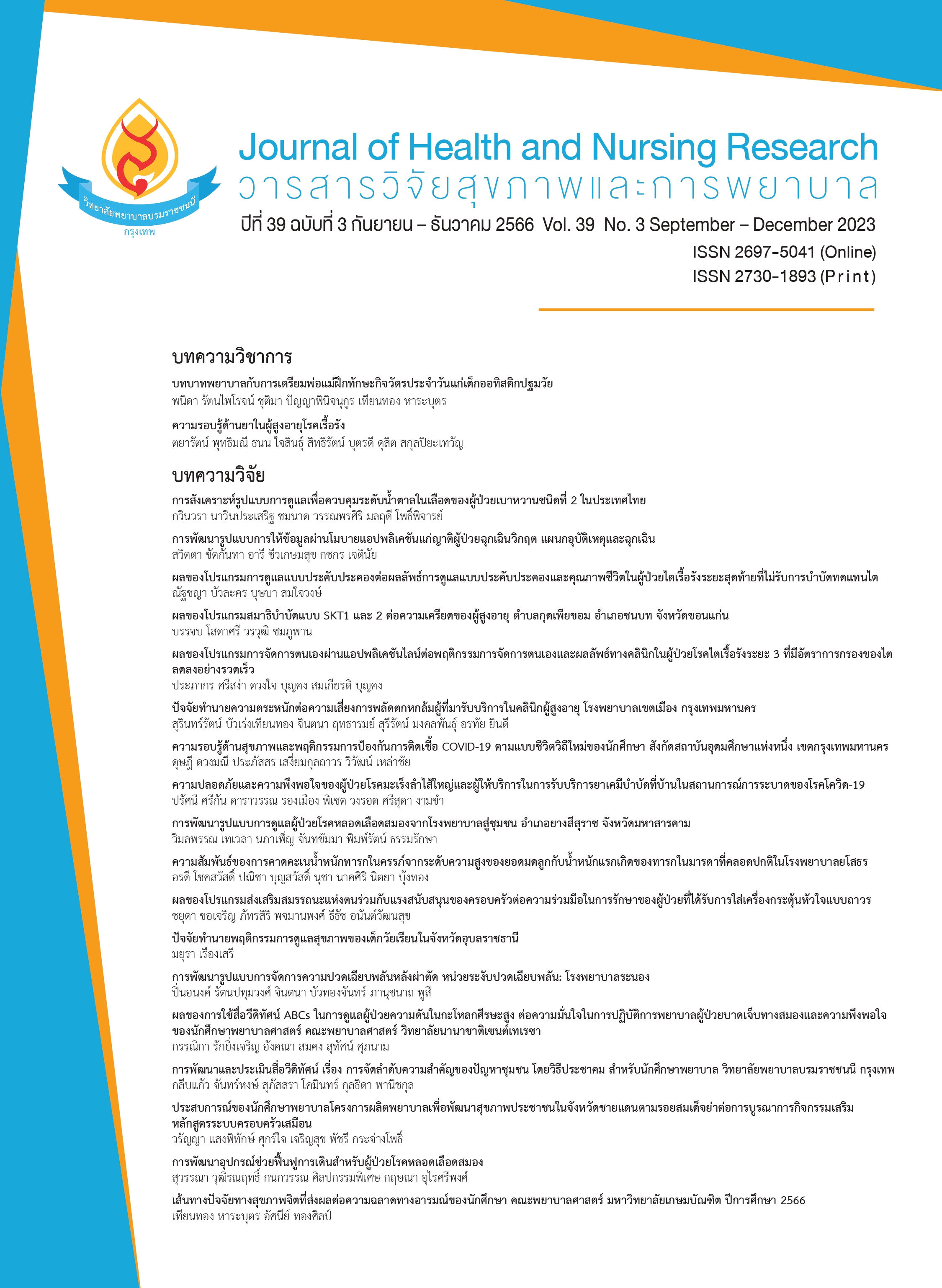ผลของโปรแกรมการจัดการตนเองผ่านแอปพลิเคชันไลน์ต่อพฤติกรรมการจัดการตนเองและผลลัพธ์ทางคลินิกในผู้ป่วยโรคไตเรื้อรังระยะ 3 ที่มีอัตราการกรองของไตลดลงอย่างรวดเร็ว
คำสำคัญ:
โปรแกรมการจัดการตนเอง , แอปพลิเคชันไลน์ , พฤติกรรมการจัดการตนเอง , ผลลัพธ์ทางคลินิกบทคัดย่อ
บทนำ: โรคไตเรื้อรังเป็นโรคที่รักษาไม่หายขาด การมีพฤติกรรมจัดการตนเองที่เหมาะสมจะช่วยชะลอความเสื่อมของไตและส่งผลต่อผลลัพธ์ทางคลินิกที่ดีขึ้น
วัตถุประสงค์การวิจัย: เพื่อศึกษาผลของโปรแกรมการจัดการตนเองผ่านแอปพลิเคชันไลน์ต่อ พฤติกรรมการจัดการตนเองและผลลัพธ์ทางคลินิกในผู้ป่วยโรคไตเรื้อรังระยะ 3
ระเบียบวิธีวิจัย: การวิจัยครั้งนี้เป็นการวิจัยแบบกึ่งทดลอง กลุ่มตัวอย่างเป็นผู้ป่วยโรคไตเรื้อรังระยะ 3 ที่มีอัตราการทำงานของไตลดลงอย่างรวดเร็วที่โรงพยาบาลเรณูนคร คัดเลือกกลุ่มตัวอย่างโดยการสุ่มอย่างง่าย จำนวน 60 คน แบ่งเป็นกลุ่มทดลองและกลุ่มควบคุม กลุ่มละ 30 คน กลุ่มทดลองได้รับโปรแกรมเป็นระยะเวลา 12 สัปดาห์ กลุ่มควบคุมจะได้รับการดูแลตามปกติ เครื่องมือที่ใช้เป็นโปรแกรมการจัดการตนเองผ่านแอปพลิเคชันไลน์ แบบสัมภาษณ์ข้อมูลทั่วไป และแบบสอบถามพฤติกรรมการจัดการตนเอง วิเคราะห์ข้อมูลด้วยสถิติเชิงพรรณนา สถิติ Mann-whiney U test และสถิติ Independent t test
ผลการวิจัย: หลังจากได้รับโปรแกรมค่าคะแนนเฉลี่ยพฤติกรรมการจัดการตนเอง (M=80.73, SD=8.72) และค่าเฉลี่ยอัตราการกรองของไตของกลุ่มทดลอง (M=60.84, SD=5.62) สูงกว่ากลุ่มควบคุม (M=57.76, SD=13.24; M=44.83, SD=9.40 ตามลำดับ) อย่างมีนัยสำคัญทางสถิติ (P< .01) และกลุ่มทดลองมีค่าสมรรถภาพของไตดีขึ้น (M=1.03,SD= .28) กลุ่มควบคุม (M=1.58,SD= .33) อย่างมีนัยสำคัญทางสถิติ (P< .01)
สรุปผล: โปรแกรมการจัดการตนเองผ่านแอปพลิเคชันไลน์มีประสิทธิภาพในการปรับเปลี่ยนพฤติกรรมการจัดการตนเอง ช่วยเพิ่มระดับ eGFR และลดระดับ Cr ในผู้ป่วยโรคไตเรื้อรังระยะ 3
ข้อเสนอแนะ: ดังนั้นควรใช้โปรแกรมการจัดการตนเองผ่านแอปพลิเคชันไลน์มาใช้ในการพยาบาลเพื่อปรับปรุงพฤติกรรมการจัดการตนเองและการชะลอไตเสื่อมในผู้ป่วยโรคไตเรื้อรังระยะ 3 ที่มีอัตราการกรองของไตลดลงอย่างรวดเร็ว
Downloads
เอกสารอ้างอิง
Kovesdy C. Epidemiology of chronic kidney disease: an update 2022. Kidney International Supplements 2022;12(1):7-11.
Division of non-communicable disease. Annual Report 2022. Bangkok: Graphic design; 2022. (in Thai)
Kefale B, Alebachew M, Tadesse Y, Engidawork E. Quality of life and its predictors among patients with chronic kidney disease: A hospital-based cross sectional study. PLoS One. 2019;14(2):1-16.
Kalantar-Zadeh K, Lockwood M, Rhee C, Tantisattamo E, Andreoli S, Balducci A, et al. Patient-centered approaches for the management of unpleasant symptoms in kidney disease. Nature Reviews Nephrology 2022;18(3):185-98.
Brad H, Sharon G, Jonathan B, Frank B, Kelly A, Burdge T, et al. KDIGO 2021 clinical practice guideline for the management of glomerular diseases. Kidney International. 2021;100(4):1-276.
Coresh J, Turin T, Matsushita K, Sang Y, Ballew S, Appel L, et al. Decline in estimated glomerular filtration rate and subsequent risk of end-stage renal disease and mortality. Journal American Medical Association 2014;311(24):2518–31.
Oshima M, Toyama T, Haneda M, Furuichi K, Babazono T, Yokoyama H, et al. Estimated glomerular filtration rate decline and risk of end-stage renal disease in type 2 diabetes. Public Library of Science 2018;13(8):1-15.
Teerasiriroj T, Lertlum L. The role of nurses in health promotion and prevention for slowing progression of chronic kidney disease in stage 3-4 CKD patient. Nursing, Health, and Education Journal 2023;6(1):76-85. (in Thai)
Lorig K, Holman H. Self-management education: history, definition, outcomes, and mechanisms. Annals of Behavioral Medicine 2003;26(1):1-7.
Methakanjanasak N. Self-management of end-stage renal failure patients treated by hemodialysis [doctoral’s thesis]. Chiang Mai: Chiang Mai University; 2005. (in Thai)
Sonja W. The effects of self-management on health behaviors and kidney function of patients with chronic kidney injury stage 3. Health Science Research 2021;15(3):120-32. (in Thai)
Klatinpoo B, Oba N, Neawbood S. Effect of a behavioral modification program in complication control of diabetes patients with chronic kidney complication. Journal of Health and Nursing Education 2020;26(1):58-70. (in Thai)
Nakhonphanom provincial health office. Health data center [internet]. 2023 [cite 2023 Aug 1]. Available from: https://golink.icu/s4mtbai.
Silapavitayatorn B, Chitpakdee B. The use of health information technology in nursing for patient safety. Journal of Nursing and Health Care 2020;38(2):6-14. (in Thai)
Vadtanapong O. Nursing informatics: trends and application. Nursing journal 2021;48(2):295-304. (in Thai)
Kidney disease improving global outcome. KDIGO 2021 Clinical practice guideline for the management of blood pressure in chronic kidney disease. Kidney International Supplements 2021;99(3):1-87.
Phongissaranuporn S, Laipoonsawad S, Supachaipanichpong P. Outputs of self-management support program for delayed-progression of diabetes nephropathy and clinical outcomes in patients type 2 diabetes mellitus Damnoen Saduak hospital. Medical Journal 2018;37(2):148-58. (in Thai)
Chuwongin D, Molek R, Boonprajak K, Sombutboon M, Preechakoon B. Nursing communication; in disruptive medicine. The Journal of Chulabhorn Royal Academy 2020;2(2):25-38. (in Thai)
Vainauskien V, Vaitkien R. Enablers of patient knowledge empowerment for self-management of chronic disease: an integrative review. International Journal of Environmental Research and Public Health 2021;18(5):2247-59.
Chaodamrongsakul C. Development of the self-care promoting model for diabetes mellitus patients at Sida hospital. Regional Health Promotion Center 9 2020;14(35):314-29. (in Thai)
Ratanasri P. Outcomes of self-management support program for delayed progression of diabetic nephropathy on self-management behaviors and clinical outcome in patients type 2 diabetes mellitus in Samran subdistrict health promoting hospital. Khon Kaen provincial health office 2022;4(2):209-24. (in Thai)
Phuntanasiri S. Correlation of renal function tests with ultrasonographic findings in chronic kidney disease. Department of medical services 2020;45(4).44-54.
Lee M, Wu S, Lu K, Wang W, Chen Y, Tai C. Effect of patient-centered self-management program on blood pressure, renal function control, and the quality of life of patients with hypertensive nephropathy: A longitudinal randomized controlled trial. Biological Research for Nursing 2022;24(2):216-25.
ดาวน์โหลด
เผยแพร่แล้ว
รูปแบบการอ้างอิง
ฉบับ
ประเภทบทความ
สัญญาอนุญาต
ลิขสิทธิ์ (c) 2023 วารสารวิจัยสุขภาพและการพยาบาล (วารสารวิทยาลัยพยาบาลบรมราชชนนี กรุงเทพ)

อนุญาตภายใต้เงื่อนไข Creative Commons Attribution-NonCommercial 4.0 International License.
บทความที่ได้รับการตีพิมพ์ เป็นลิขสิทธิ์ของวารสารวิจัยสุขภาพและการพยาบาล (วิทยาลัยพยาบาลบรมราชชนนี กรุงเทพ) ไม่สามารถนำไปตีพิมพ์ซ้ำในวารสารฉบับอื่น


















